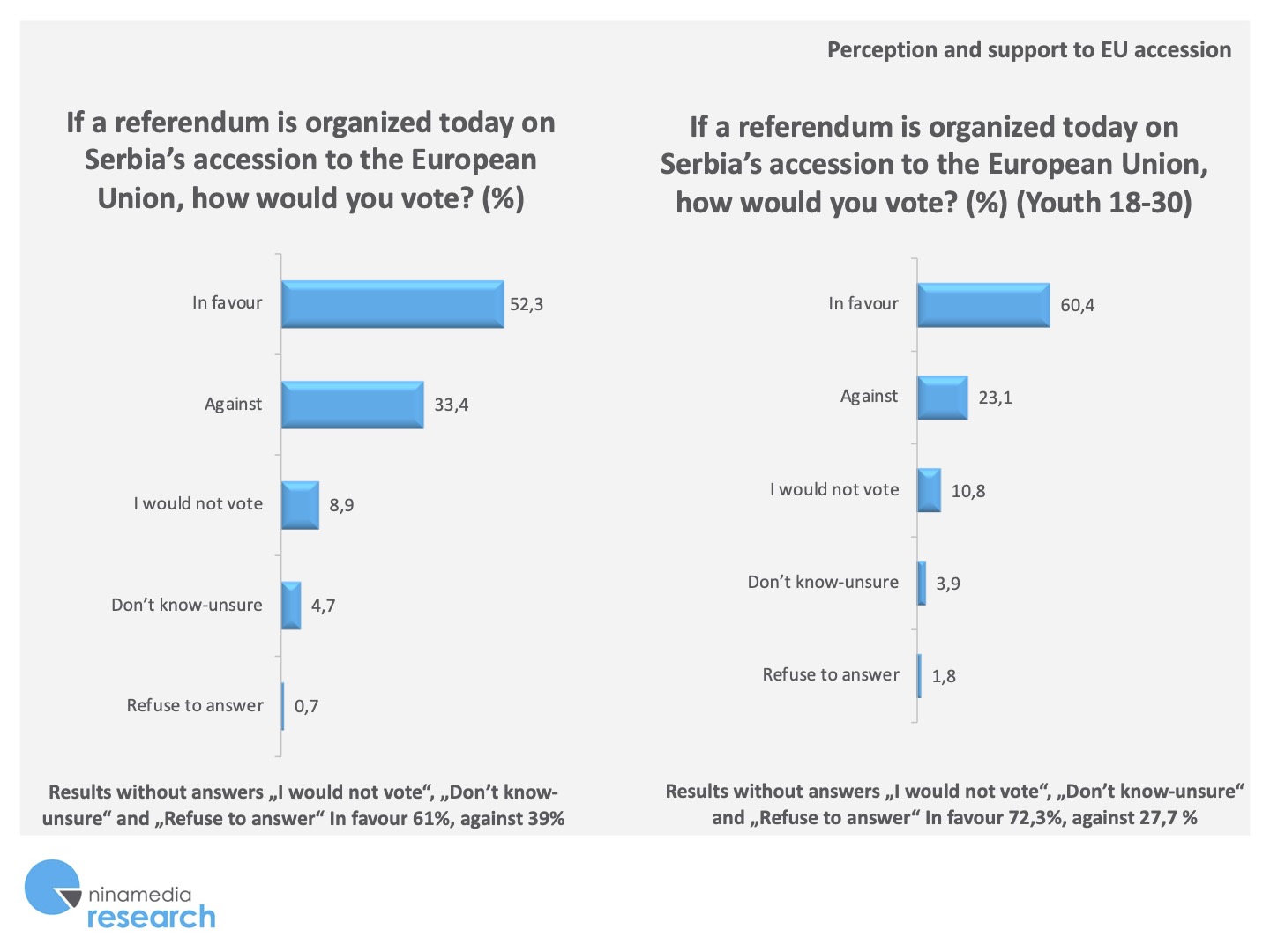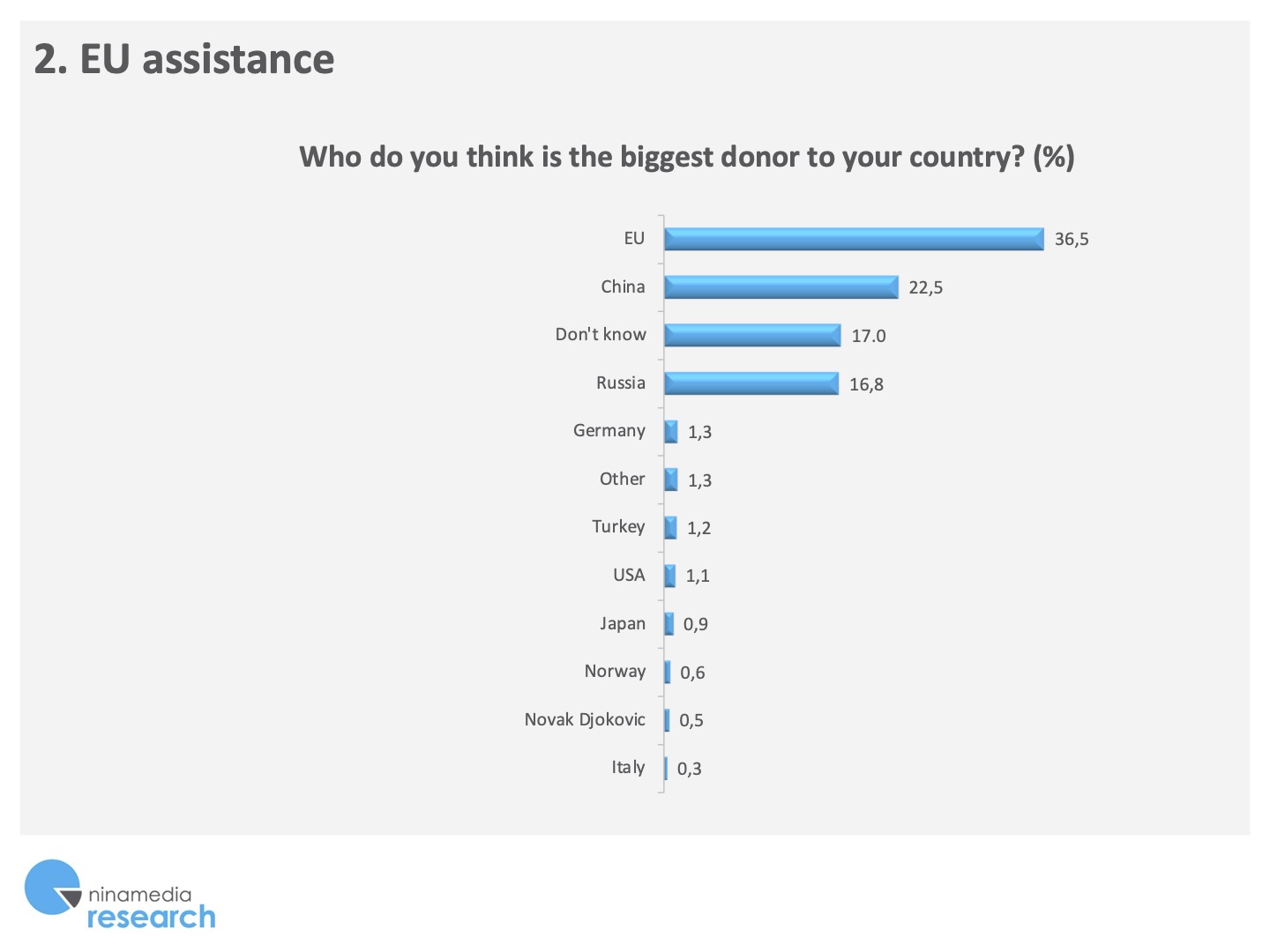Better economic standards, higher salaries and pensions, future job opportunities, visa-free travelling benefits are some of the first associations with the EU according to the latest opinion poll conducted by Ninamedia for the European Union Delegation to Serbia.
More than half of respondents (52%) would vote in favour of EU accession and 33,4% against if the referendum on Serbia’s EU membership is organized today. Counting only those who would express an opinion, a referendum would therefore lead to a 61% – 39% result in favour of EU accession. Support to EU accession is in particular strong among the youth (18 – 29 year old), who would vote at 60.3 % in favour of EU accession while only 23.1 % would vote against.

On all issues tested, from agricultural production to protection of environment, salaries, public administration, Rule of Law, education and fight against corruption, more citizens consider that things will get better when Serbia will join the EU than those who consider that things will stay the same or would get worse.
“Economic prosperity, higher salaries, social welfare, environmental protection, Rule of Law, fight against corruption are fundamental values and objectives of the EU, and this is what Serbian citizens recognize in the EU. It is positive that these are the aspirations that Serbia as a country shares. Both the EU and Serbia have made accession of Serbia to the EU a priority and data show clearly that this matches the will of the Serbian population, in particular among the youth. While these trends are not new, it is always encouraging to see that the work that we do all year long in preparing Serbia for accession is confirmed by what people expect”, said Sem Fabrizi, Head of the Delegation of the European Union to Serbia.
“Several waves of research within the same project methodology indicate relatively stable values of support of Serbian citizens for joining the European Union. Young people under the age of 30 give more support to the EU than other age cohorts and these data are confirmed in numerous studies”, said Jelena Fratucan, director of Ninamedia.
It is also important to reflect on figures where only 36,8% of Serbian citizens believe that EU accession will happen before 2030, while 32,9% consider that it will happen after 2013 and 22,9% that it will never happen. And only 43% of citizens believe that EU wants Serbia as a member while 46% think the opposite.
Results of the research showed also that better and more objective communication on the EU remains an overall necessity for Serbian citizens. More than half (53.5%) of respondents considers that they are not sufficiently informed about the way EU functions, as well as advantages and consequences of EU membership. “Information on how ordinary people live in the EU”, “political consequences of EU accession” and “effects of accession on economic situation and living standards” are the three areas on which citizens would like most to have more information about.

Awareness on EU donations to Serbia is however very high. Close to 50% (49%) of the population says they are aware of EU donations to Serbia, especially in “education”, “economy” and “environmental protection”. 54% of the population says that they have heard of EU assistance to Serbia in the fight against COVID-19. 36,5% of the respondents are aware that the EU is the biggest donor to Serbia, far ahead of any other countries or organisations.
When asked which sectors should be prioritised by EU assistance in Serbia, respondents quote most frequently ‘Agriculture’, ‘Health’ and ‘Economy’, which generally matches the reality of EU donations.
The survey shows also high support to the Belgrade – Pristina dialogue mediated by the EU, with 57% saying they mainly or fully support the dialogue against 35% who mainly or fully don’t support it. “The fact that there is a dialogue, normalisation of relations and some forms of cooperation” (19,1%), “peace and the lowering of tensions” (16,2%), and “the preservation of monuments” (12%) are most frequently mentioned by respondents as the biggest achievements of the dialogue, while only 11,4% of them believe that nothing was achieved.
The research was conducted in November-December 2020 with 1202 sample size from 40 towns and municipalities, using CAPI method – (Computer assisted personal interviewing).